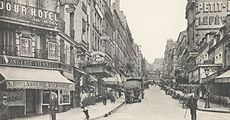Rue Lepic

Rue Lepic in 1925, seen from Place Blanche
|
|
| Length | 755 m (2,477 ft) |
|---|---|
| Width | 10 to 14 m (33 to 46 ft) |
| Arrondissement | 18th |
| Quarter | Montmartre, Grandes Carrières |
| From | boulevard de Clichy |
| To | place Jean-Baptiste-Clément |
| Construction | |
| Denomination | Decree of 24 August 1864 |
Rue Lepic is an ancient road in the commune of Montmartre, in the 18th arrondissement of Paris, climbing the hill of Montmartre from the boulevard de Clichy to the place Jean-Baptiste-Clément
It is an ancient road resulting of rectification and re-arrangement of several dirt-roads leading to the Blanche barrier (Place Blanche), starting life as Chemin-neuf (Le chemin-vieux was rue de Ravignan). In 1852 it was renamed rue de l'Empereur, and renamed again in 1864, after the General Louis Lepic (1765-1827).
Painter and engraver lived and worked on rue Lepic. He successively occupied addresses n°92, n°87, n°97, and also n°102.
Louis Renault built his first car in 1898, calling his car the Voiturette. On December 24, 1898, he won a bet with his friends that his invention was capable of driving up the slope of Rue Lepic. As well as winning the bet, Renault received 12 definite orders for the vehicle.
On 7 September 1960, Fernand and Jackie Sardou opened their cabaret Chez Fernand Sardou on the road in place of cabaret Belzébuth next to the residence of Utrillo. The cabaret became a preferred meeting place and played to a full house every night. Michel Sardou had his professional début there, firstly as a server.
In the Claude Autant-Lara film, La Traversée de Paris (1956), "Martin" (played by André Bourvil) et "Grandgil" (played by Jean Gabin) were pictured in this road during the German occupation of France transporting a jointed pig destined for the black market.
...
Wikipedia

